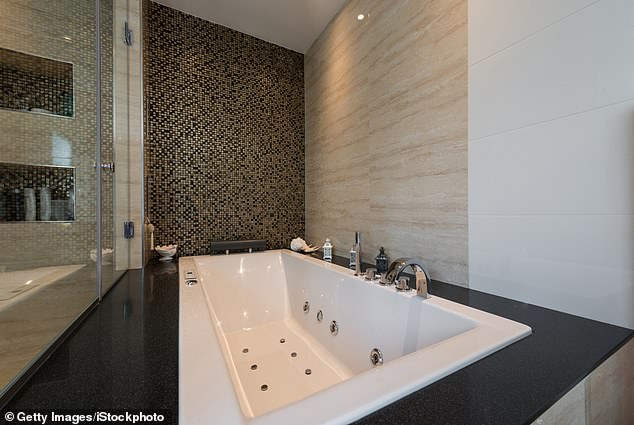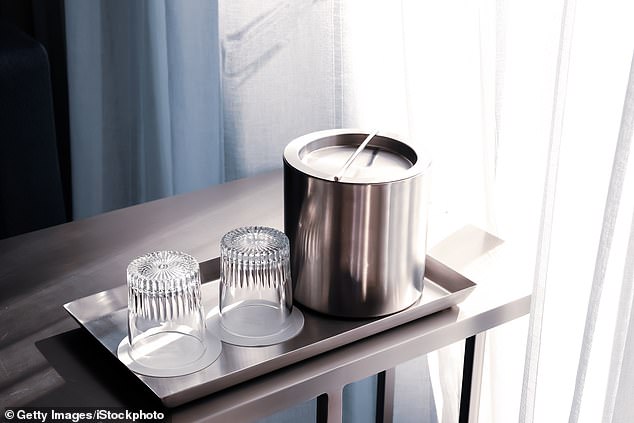Hotel rooms may look sparkling clean when you first arrive – but surprising levels of bacteria and viruses can be lurking in overlooked places.
Beyond the usual suspects like sinks and toilets, common ‘touchpoints’ such as remotes and light switches are also crawling with germs, studies say.
University of Houston research found hotel rooms had up to 10 times more bacteria – including fecal strains – than are allowed in hospitals.
One reason? Hotel staff often spend just 30 minutes cleaning each room, and some decorative items may be skipped entirely, according to Enza Laterrenia, head of housekeeping at Canne Bianche Lifestyle Hotel in Italy.
Here’s where the germs are hiding – and what experts say you should do as soon as you check in.
1. Decorative items
‘Having worked in hotels, the first thing I fling off to a far corner of the room are decorative pillows and any decorative runner that goes along the foot of the bed,’ Maria Diego, a San Diego-based travel adviser, told Travel & Leisure. ‘These never get washed.’
Duvet covers can also be a hotspot.
‘Most hotels do not wash the big duvet. They only wash the sheets,’ a former hotel staffer wrote on Reddit last year.

Experts warn decorative pillows and bed runners are rarely – if ever – washed between guests

Maria Diego, a San Diego-based travel adviser, says the first thing she does upon entering a hotel room is toss the decorative pillows and bed runner into a corner – because ‘these never get washed’
2. High-touch surfaces
Diego said she’s cautious around remotes, light switches, phones, and other commonly used surfaces.
Rani Cheema, a Los Angeles travel adviser, singled out the room phone: ‘I am grossed out by the receiver,’ she said. ‘No one’s cleaning that.’
Carpets are another offender. According to Cheema, many high-end hotels are now replacing them with hard floors or area rugs for hygiene reasons.
3. Bathtubs
Studies have shown that hotel bathrooms can be dirtier than airplane lavatories – particularly the countertops. But the bathtub is even worse.
A 2023 investigation by WaterFilterGuru.com found that tubs can harbor up to 40 times more bacteria than a toilet seat.
‘I also won’t take a bath in a hotel unless it’s a super-luxe five-star hotel, and only if it’s a non-jet bathtub,’ Diego said. Jetted tubs, experts warn, can be difficult to disinfect and may house hidden bacteria.

Hotel bathtubs can harbor up to 40 times more bacteria than a toilet seat, researchers found
4. Hard-to-reach and overlooked spots
Curtain rods, ceiling fans, showerheads and bedside lamps are often missed during cleanings, Laterrenia said.
‘When I enter a room and notice a dusty charging port next to the bed or a bedside lamp caked in residue, that tells me the basics may have been done, but the details were missed,’ Lori Carter told Fox News Digital.
5. Glasses and ice buckets
Glassware may not always be replaced between guests. In some cases, housekeeping has been found simply wiping them down.
‘Personally, I never use mugs or glasses in the room without rinsing them out first,’ Carter said. ‘I usually boil water in the kettle and give each item a thorough rinse.’
‘It’s not about fear, it’s about good habits,’ she added.
And the ice bucket? That could be the next breeding ground.
During one norovirus outbreak at a hotel, guests vomited in ice buckets, helping the illness spread, Brian Labus, an associate professor of epidemiology at the University of Nevada, Las Vegas, told Travel & Leisure last year.

Experts advise rinsing hotel glasses and avoiding ice buckets without liners — one outbreak was traced to guests vomiting in them
Experts recommend only using buckets with liners – or bringing your own cooler and drinkware if you’re worried.
If anything seems off, Carter added, don’t hesitate to alert the front desk.
‘The staff can have the room cleaned again or move you to another room,’ she said.










